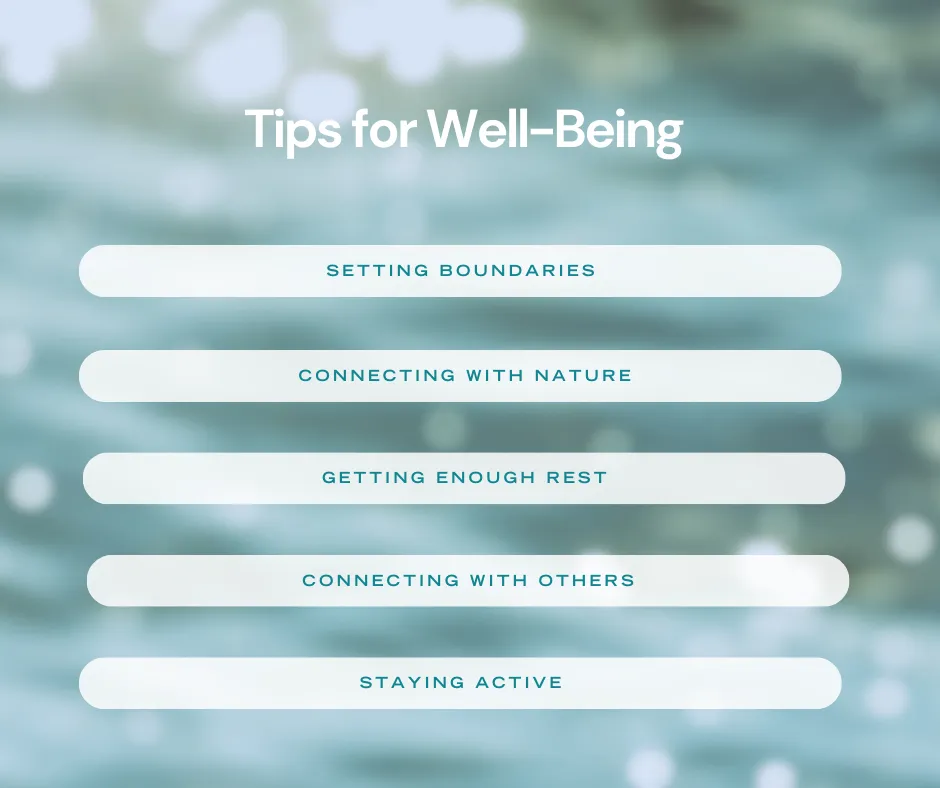
Five Pillars of Wellness: Transform Your Life One Step at a Time
In our fast-paced world, maintaining well-being can sometimes feel like an impossible task. However, focusing on a few key areas can create a significant positive impact on your overall health and happiness. Let's explore five essential pillars of wellness that can help you build a more balanced and fulfilling life.
1. Setting Boundaries
Boundaries are the foundation of healthy relationships and personal well-being. They define what's acceptable and what isn't in your interactions with others and yourself.
Why it matters: Without clear boundaries, you're likely to experience burnout, resentment, and stress. Setting limits protects your energy and mental health.
How to implement:
Learn to say "no" without guilt
Communicate your needs clearly and respectfully
Identify your limits in different areas of life (work, relationships, time, etc.)
Create physical and digital boundaries (like device-free times)
2. Connecting with Nature
Humans have an innate connection to the natural world, yet modern life often keeps us indoors and disconnected from the earth.
Why it matters: Studies show that time in nature reduces stress, improves mood, boosts creativity, and even enhances immune function.
How to implement:
Take daily walks in green spaces
Bring plants into your home and workspace
Plan weekend hikes or outdoor activities
Practice grounding techniques by walking barefoot on grass or sand
Simply sit and observe natural settings without distractions
3. Getting Enough Rest
Rest is not a luxury—it's a biological necessity. Yet many of us treat sleep as an afterthought or something to be sacrificed in the name of productivity.
Why it matters: Quality rest affects everything from cognitive function and emotional regulation to physical health and immune response.
How to implement:
Aim for 7-9 hours of sleep per night
Create a consistent sleep schedule, even on weekends
Develop a relaxing bedtime routine
Make your bedroom a sleep sanctuary (cool, dark, and quiet)
Limit screen time before bed
4. Connecting with Others
Human beings are social creatures. Meaningful connections are vital for our emotional well-being and sense of belonging.
Why it matters: Strong social ties are linked to longer life expectancy, better mental health, and increased resilience during difficult times.
How to implement:
Schedule regular time with friends and family
Join groups or communities based on your interests
Practice active listening in your conversations
Reach out to someone you haven't connected with in a while
Consider volunteering to build connections while helping others
5. Staying Active
Regular movement is one of the most powerful tools for improving both physical and mental health.
Why it matters: Exercise releases endorphins, reduces stress, improves cardiovascular health, and boosts energy levels.
How to implement:
Find activities you genuinely enjoy
Start with small, manageable goals (like a 10-minute daily walk)
Incorporate movement into your daily routine (taking stairs, walking meetings)
Mix different types of exercise (cardio, strength, flexibility)
Remember that consistency matters more than intensity
Integrating These Pillars Into Your Life
The key to lasting wellness isn't perfect adherence to all these areas at once, but rather small, consistent steps in the right direction. Start by identifying which pillar needs the most attention in your life right now and focus there.
Remember that wellness is a journey, not a destination. Be patient and compassionate with yourself as you work to build healthier habits. Celebrate small victories and learn from setbacks without judgment.